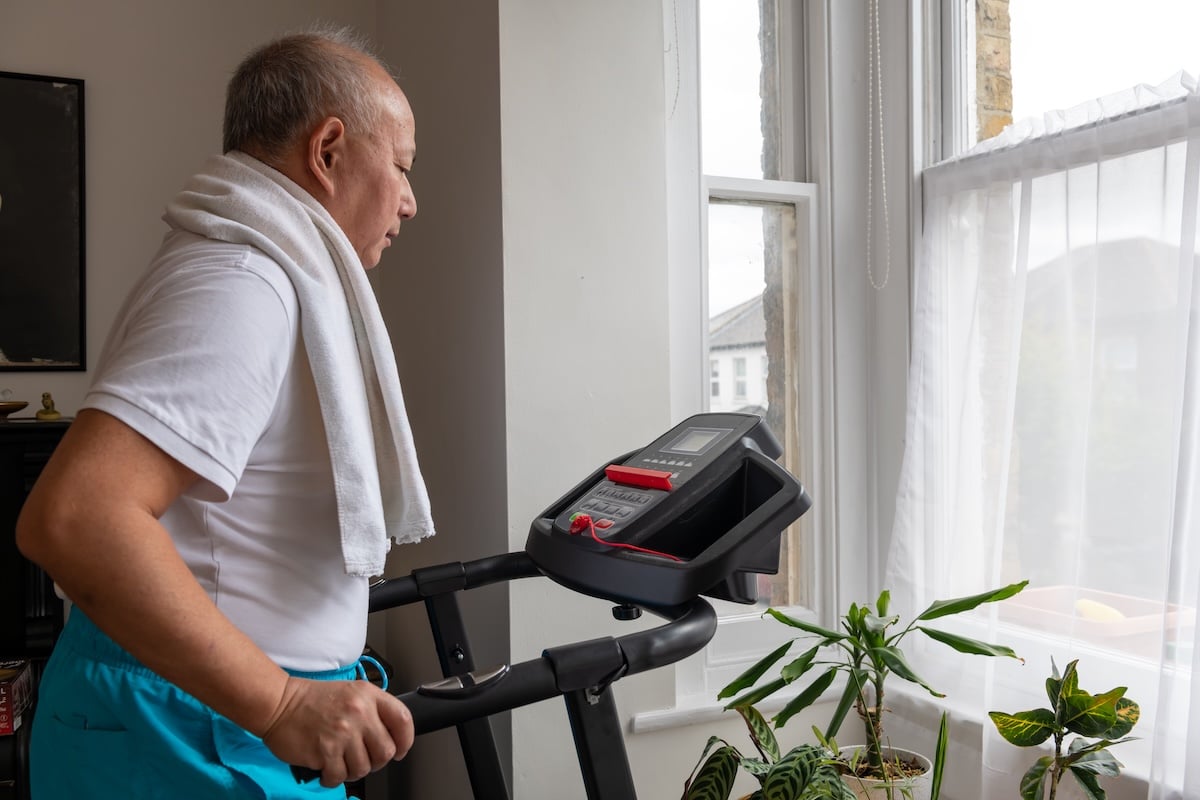It’s 1 a.m. and you are wide awake. When you have been looking forward to a good night’s sleep, finding yourself awake in the middle of the night can be frustrating. Not getting the sleep you need — and even having poor-quality sleep — can hurt your health.
And as we age, our sleep requirements change. Older adults need about as much sleep or even more sleep than younger people — between seven to nine hours a night — but often don’t get that much due to issues like trouble falling and staying asleep, says the National Institute on Aging [1]. Remember that, like other expected health challenges, sleep issues are a normal part of aging.
Here's all you need to know about poor sleep patterns and how to sleep better.
What Causes Sleep Problems in Older Adults
Sleep problems are common in older adults and can be caused by a variety of factors, including the following:
1. Normal Aging Process
As you age, your sleep patterns tend to change. Older people may experience changes in sleep architecture, such as a decrease in deep sleep (also known as slow-wave sleep) and an increase in lighter stages of sleep. This can result in more fragmented and less restorative sleep.
2. Medical Conditions
Older adults are more likely to have medical conditions that can disrupt sleep. Chronic pain conditions, such as arthritis, and medical conditions like Alzheimer's disease can interfere with sleep. Other common sleep disorders like restless legs syndrome (RLS), nocturia, and sleep apnea can lead to poor sleep quality.
Many older adults with Alzheimer's disease may not be able to sleep enough while some might sleep too much, leading to sleep difficulties when you need to sleep at night.
3. Medications
Adults aged 65 and older tend to take more medications, and certain medications can disrupt your sleep quality. For example, some medications used to treat hypertension, asthma, and depression can cause insomnia or disrupt sleep patterns.
4. Psychological Factors
Older adults may experience psychological factors that affect sleep, such as stress, anxiety, depression, and grief. These emotional issues can contribute to insomnia or difficulty falling asleep.
Addressing psychological factors that contribute to reduced sleep in older adults often requires a holistic approach. This may involve seeking support from mental health professionals, such as therapists or counselors, who can provide strategies for managing stress, anxiety, depression, and grief.
5. Lifestyle Factors
Certain lifestyle factors can lead you to develop poor sleep habits. Irregular sleep schedules, lack of physical activity, excessive daytime napping, and consumption of stimulants like caffeine or alcohol close to bedtime can reduce your hours of sleep each night and make it hard to sleep.
6. Environmental Factors
The sleep environment plays a role in sleep quality. Factors such as excessive noise, uncomfortable temperature, poor mattress or pillow quality, and excessive light can interfere with sleep.
One of the best ways to promote good sleep as you get older is to create comfortable sleeping conditions that enhance sleep quality.
How Older Adults Can Improve Sleep Quality and Enjoy Better Sleep
If you find yourself awake in the wee hours of the morning, resist the urge to reach for a sleep aid. Instead, consider these sleep quality tips.
1. Stick to a Schedule
One of the easiest ways to promote sleep disorders is by drifting off to sleep anytime in the day. Our bodies like routines and sleep is no different. Establishing a regular sleep schedule helps regulate the body's internal clock. Going to bed and waking up at the same time every day, even on weekends, can improve sleep quality in older adults.
2. Reduce or Eliminate Daytime Naps
Napping too much during the day can hurt your nighttime sleep. Avoid long or frequent daytime naps, especially close to bedtime. If a nap is necessary, keep it short (around 20-30 minutes) and avoid napping too late in the day, as it can interfere with nighttime sleep.
3. Ditch the Caffeine
This stimulating substance is found in more than just coffee. Stop consuming caffeinated products — tea, chocolate, soda, energy drinks, and even some pain relievers — four to six hours before you head to bed [2]. If you smoke, try to avoid using tobacco products too close to bedtime, as these can also have a stimulating effect.
4. Give Yourself 20 Minutes
If you’re not asleep after 20 minutes, get out of bed, go to another room, and do a relaxing activity like reading, listening to music, or meditating until you are tired. This rule also applies if you wake in the middle of the night.
Try not to watch the clock as you attempt to drift off. Doing so can increase your stress, which makes it harder to fall asleep. Instead, turn the clock’s face away from you.
Learn some of the best mindfulness and meditation techniques to help you improve your sleep at night.
5. Create — and Stick to — a Bedtime Routine:
Bedtime routines aren’t just useful for little ones and let our bodies know it’s time to wind down for the day. Taking a warm bath or shower, reading a book, knitting, or listening to music can all help you relax. And though it may be tempting, try to avoid using your tablet, computer, or watching TV as part of your bedtime routine. The light emitted from these devices can interfere with sleep.
We all have the occasional sleepless night, but if you’ve tried the above tips and still find you have trouble sleeping after a few weeks, contact your doctor. Your doctor will refer you to a sleep specialist who can help you work on your sleep cycle to promote restful sleep.
6. Review Your Medications
As mentioned earlier, medications can also interfere with sleep quality. If you notice that you don't sleep well after using a certain drug, consult with a healthcare professional to review the medications and their potential impact on sleep.
They can assess whether any adjustments or alternatives are suitable to minimize sleep disruptions.
7. Engage in Regular Physical Activity
Many older people may experience sleep disorders due to inactivity. Regular exercise during the day has been shown to help people achieve better sleep quality.
This is because engaging in physical activity, within your capabilities, puts your body in a position to want rest. Aim for at least 30 minutes of moderate-intensity exercise most days of the week, but avoid exercising too close to bedtime, as it can be stimulating.
8. Use Over-the-Counter Sleep Aids
You can improve your sleep quality using some sleep stimulants that induce drowsiness and facilitate the initiation of sleep. Before using over-the-counter medication, consider things like the type of sleep aid and the potential side effects.
Also, note that OTC sleep aids are generally intended for short-term use to help with occasional sleep difficulties. They are not recommended for long-term use without consulting a healthcare professional.
9. Create a Sleep-Friendly Environment
Ensure that the sleep environment is comfortable, quiet, and conducive to sleep. Keep the bedroom dark and at a cool temperature, and consider using earplugs or a white noise machine to drown out any disruptive sounds. A comfortable mattress, pillows, and bedding can also help you sleep better at night.
By practicing these quality sleep tips for older adults, adults age 60 and older can eliminate less sleep, and fragmented sleep, and promote their sleep quality.
What is the Best Sleeping Position for Older People?
The best sleeping position for older adults is sleeping on the back (supine position). It is often considered the best choice and here's why:
- Spinal Alignment: Sleeping on your back helps you maintain a neutral spine alignment, especially if you have back pain or spinal issues. It allows your head, neck, and spine to rest in a natural position, reducing the risk of strain or discomfort.
- Acid Reflux and Heartburn: Back sleeping can help minimize acid reflux and heartburn symptoms. When lying on your back, gravity can work to keep stomach acids from flowing back into the esophagus, which can be particularly helpful if you're prone to these issues.
- Facial Wrinkles: Sleeping on your back can help reduce the development of facial wrinkles. When sleeping on the side or stomach, the face can be pressed against the pillow, leading to increased pressure and potential wrinkling of the skin over time.
Note, however, that many adults require different sleeping positions, depending on factors such as comfort, health challenges, etc. Additionally, medical conditions like sleep apnea and snoring may not work well with sleeping on your back. It is crucial to develop a sleeping position that works best for you or work hand-in-hand with your healthcare provider to choose one.
Conclusion
Older adults can improve sleep quality by maintaining a consistent schedule, creating a sleep-friendly environment, practicing relaxation techniques, engaging in regular physical activity, managing stress, and seeking treatment for sleep disorders. Prioritizing sleep and making positive changes can enhance overall well-being and cognitive function.













